ALLY B.
In an SHTF situation, no one knows what to expect. Yet, we have to be well prepared.
One of the main things we need to have secured is food, but stockpiling and prepping foods can add up to be a little bit expensive.
That’s where having sustainable food sources comes in. I always recommend growing/ raising your own food.
Having livestock, even a small one, can be a very smart decision and should be on any prepper’s survival plan. It is something that you can benefit from almost immediately, while also lasting you during difficult times.
Livestock can be useful in more than one way. We can mention producing foods and raw materials, a cash investment, transportation, and many more, depending on your need and the animal you chose to raise.
Related: Livestock Animals You Should Start Raising For The Upcoming Economic Crisis
I recently started reading articles online and making research on the right animals to raise and have in times of crisis, in order to educate myself.
I found many options, such as ducks, rabbits, goats, and many more, but the most common and easiest one is chickens.
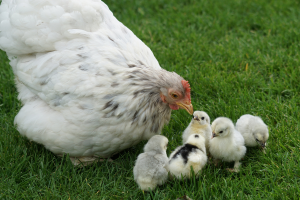 Chickens are family-friendly and can be raised in small spaces and backyards, whether it’s an urban setting or a rural one.
Chickens are family-friendly and can be raised in small spaces and backyards, whether it’s an urban setting or a rural one.
These birds are very low maintenance and also a good source of protein, providing up to 300 eggs per year, as well as quality meat.
Their manure is also considered one of the best types of organic fertilizers to use.
All of that makes them the most common and widely raised animals.
Here are some of the most frequent mistakes people make when raising chickens and ways to avoid them.
Having A Chicken Coop That Is Too Small
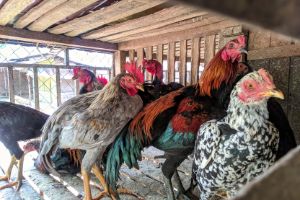 I know I have mentioned that chickens can be raised in small spaces, but not too small.
I know I have mentioned that chickens can be raised in small spaces, but not too small.
Your flock needs to have enough room to live comfortably without starting squabbles. I would also recommend building/having a chicken coop that is bigger than what you think you need.
The coop should be able to hold a feeder and water containers, a roosting area (very preferable), and a square nest box for every three hens.
⇒ 50+ Chicken Coop Secrets For A Low Effort Protein Source
A proper coop should also be roomy enough to be able to stand in it to collect your eggs and shovel manure comfortably.
Not Protecting Them From Predators
Now that you chose the right coop size, let’s discuss your flock’s safety. Chickens have different predator species, dogs, snakes, raccoons, cats, skunks, hawks, and the list goes on.
Meaning they are not safe no matter where you live. Backyard’s flocks are even more susceptible to being attacked than farmer’s ones.
So how do you protect them? Here are some useful tips :
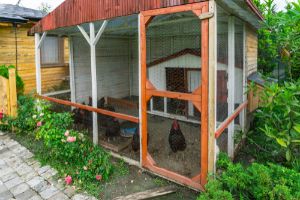 Build a high quality, tall fence around your property
Build a high quality, tall fence around your property- Always lock your chickens in at dusk, making sure windows and doors are shut tight. You can use spring-loaded latches to make them harder to open.
- As for outside guardians, guard dogs are a great choice.
- Make sure your chicken coop is close enough to your house, as having human activity tends to keep most animals or predators away.
- Reinforce the bottom of your coop. Add a hardware cloth skirt around the outside to prevent anything from burrowing underneath it.
- Remove all food remaining—garbage, livestock feed, fallen fruits from trees, or anything that can serve as an attractant to other animals.
- Consider raising a rooster, as it doesn’t only serve to fertilize your eggs and expand your flock but is also a protector of the hens against any predators.
Not Counting Your Chicken Flock
You have to keep count of your flock, or else, how would you notice if you have attracted any predators? Make sure you count them every night before locking them in their coop.
Missing a chicken can be alarming and often requires immediate action to save the rest of the flock. So, keeping track of your chickens is an essential act.
Keeping Your Vegetables Unsupervised When Your Chickens Are Out
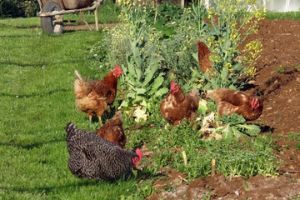 Chickens are active creatures. They enjoy exploring and playing around. By doing that, they till the earth with their feet and beaks and naturally fertilize your garden.
Chickens are active creatures. They enjoy exploring and playing around. By doing that, they till the earth with their feet and beaks and naturally fertilize your garden.
They also feed on insects, and mosquitos as well as some weeds, helping around your garden/backyard.
As beneficial as they are, they can also be as destructive to your vegetables and medicinal plants, by digging holes in your garden where they shouldn’t or eating your green leaves.
⇒ A Kit That Has Everything You Need To Start Your Medicinal Herb Garden
To prevent that from happening, installing a fence around your veggies is the best thing you can do.
Overspending On Chicken Food
Now of course you can choose to spoil your chickens by getting them store-bought feed, which costs around about $20 per 50-pound bag. Prices may vary depending on your location and the quality of the product.
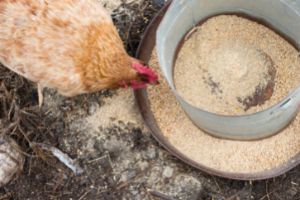
In case you didn’t know, chickens love vegetables, grains, and fruits. And it’s mainly what they consume and what the store brought feed is made from.
What you can do instead is, give them table scraps/veggies peels or even plant herbs for them. It will save you a lot long term as well as limit your food waste.
Feeding Them The Wrong Foods
I mentioned how low maintenance chickens can be, even regarding their foods, as most vegetables and fruits are safe for them to feed off. Yet, there are things you cannot feed them.
These include sugary things, food high in salt and fat such as avocadoes, raw potatoes or their peels, uncooked beans, anything that is spoiled, citrus fruits and citrus peels, and anything fried or processed.
The rule of thumb is anything organic you can eat, they most likely can too.
Not Exposing Them To Enough Light
Daylight is very important for the chicken’s reproductive system. Of course, they still need darkness to be able to sleep and recharge, but other than that, they are to be in the light.
So make sure they are exposed to daylight, natural or artificial, at least 14 hours a day. That way, you will have happy chickens and keep getting your daily delicious eggs.
I tried to provide the most important information about chickens’ livestock. There’s of course always more to learn, but this should be enough to get you to start.
In times of crisis, you are going to be glad you started acquiring survival livestock this soon. It will prepare you to better take care of your animals, provide them with an optimal environment, as well as learn to harvest and preserve the meats or maybe even start breeding to add more chickens to your flock.
All this while benefiting from the goods your birds provide for you almost daily, such as eggs, feathers, and natural fertilizers.
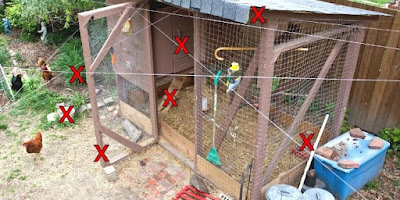
No comments:
Post a Comment